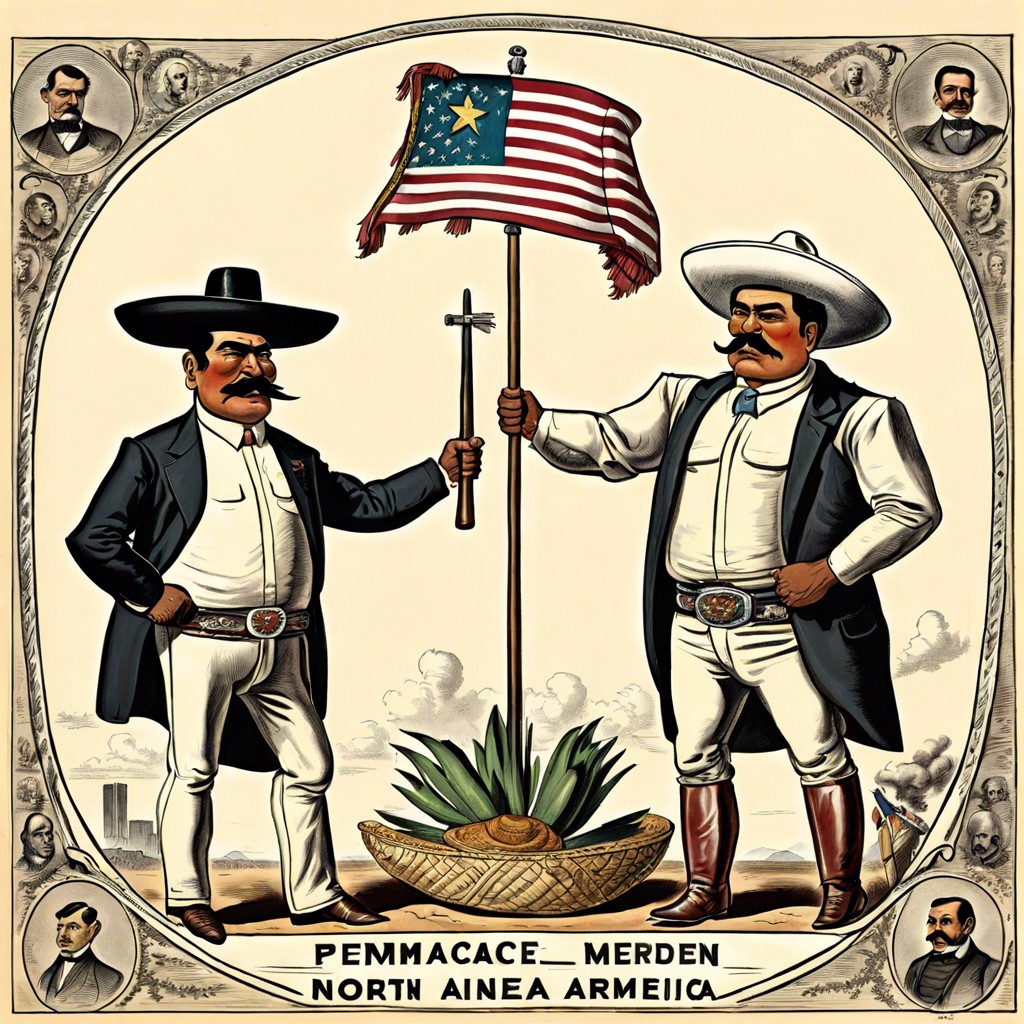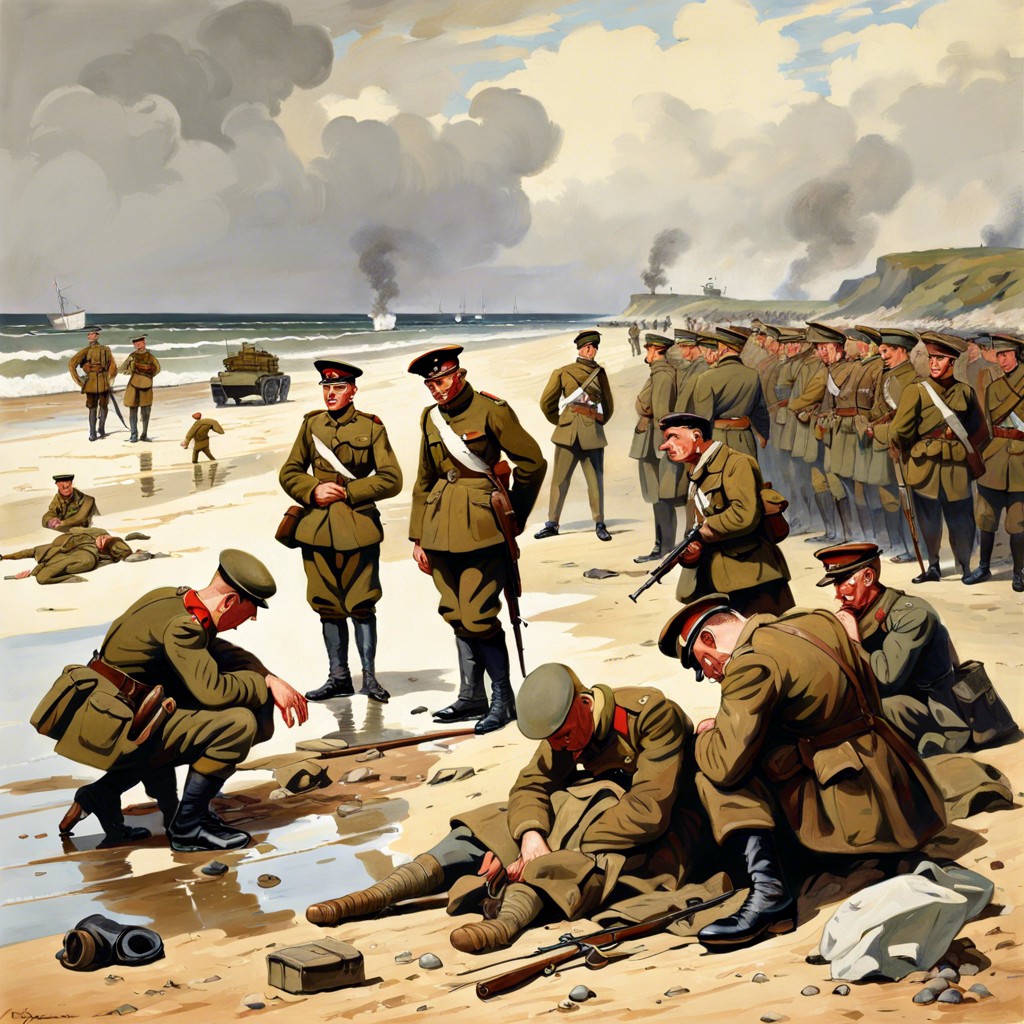If Mexico had won the Mexican-American War, the landscape of North America could have been radically different, affecting borders, cultures, and political dynamics.
Imagine a world where California tacos come with a side of jalapenos, and Texans argue over the best mole sauce. Picture the map redrawn and history rewritten if Mexico had won the Mexican-American War. Dive into this tantalizing alternate history where political, cultural, and demographic fabric of North America is stitched differently. Uncover the domino effect on U.S. expansion, trade relations, and modern geopolitics, all while asking: could Manifest Destiny have met its match? Buckle up for a journey through time and possibility!
Key takeaways:
- Mexico would have retained California, Texas, and the Southwest.
- Manifest Destiny dream would have faced obstacles in American expansion.
- Cultural fusion and demographic shifts would have shaped a bilingual nation.
- Economic recalibration: U.S. industries adapting to Mexico’s resources and trade policies.
- Long-term geopolitical effects: Mexico as a significant rival to the U.S.
Political and Territorial Repercussions for North America

Imagine a North America where California, Texas, and the Southwest are all part of Mexico. Quite the twist, right? Such a scenario would shift political power dramatically. The balance between the U.S. and Mexico would be completely different, with Mexico amassing significant influence.
First off, the state lines we know today would be a mess. No more Lone Star State as we know it; instead, we might have the Estrella Solitaria. Mexico’s victory might mean the U.S. focus stays east of the Mississippi, with fewer resources and less incentive to push westward.
Next, the political culture in Mexico would be reshaped. Governing such a vast and diverse territory could either unify the nation or splinter it further. Imagine the challenges of managing policy across newly acquired, vastly different regions. Bureaucratic chaos or a surprisingly robust administrative machine? Who knows.
Finally, international relations would be a roller coaster. With Mexico emerging as a continental powerhouse, European powers might reconsider their strategies in the Americas. Maybe they’d cozy up to Mexico, altering alliances and trade partnerships in ways we can only speculate.
Impact On U.S. Expansion and Manifest Destiny
The dream of Manifest Destiny would have hit a massive roadblock. Imagine settlers pushing westward only to find themselves crossing into Mexican territory. Awkward!
With Mexico retaining vast swathes of land like California and Texas, American expansion would have slowed. Gold Rush? More like a “Gold Pause.” The famed rush of 1848 wouldn’t have had the same sparkle with extra legal and political hurdles.
Railroads might look different, too. No seamless coast-to-coast rail systems. Instead, you’d have the world’s first international transcontinental railroad, potentially with border check-ins and taco stands.
Political ambitions? Legislators hungry for new states and votes would have hit a wall. Or rather, a border, complete with Mexican customs officials.
Culturally, the melding of American frontier life with Mexican governance could have created fascinating yet complex societal norms. Torn between two legal systems, local communities might have become mini-U.N. meetings debating the finer points of law and order.
Changes in Demographics and Cultural Exchange
Imagine a land where mariachi melodies echo not only through Mexico City but also Los Angeles. A Mexican victory in the Mexican-American War would have created a fascinating fusion of people and traditions across a larger territory. This new landscape would present unique demographic shifts and cultural exchanges.
First, English might have had to share the stage with Spanish in even more parts of what is now the U.S. region. Spanglish? Maybe it would be the norm.
Second, Mexican traditions like Dia de los Muertos and Las Posadas could have blended seamlessly with American holidays. Imagine trick-or-treating followed by a parade of radiant skeletons!
Third, urban centers like San Francisco, San Diego, and others, might have evolved with a more pronounced Mexican architectural influence. Adobe houses and plazas could have been as common as skyscrapers.
Fourth, imagine the rich culinary landscape. Enchiladas for Thanksgiving, anyone? Tacos for tailgates? Slow cookers could have stayed hidden in cupboards as everyone clambered for tamales.
Lastly, demographic trends such as immigration patterns might have looked vastly different. With fewer borders in the way, moving between places to seek opportunities might have been as easy as hopping on a bus.
A richer tapestry of traditions, languages, and lifestyles would have been woven across the continent, making the United States a truly bilingual, bicultural nation even sooner than it is today.
So next time you bite into a burrito, just think—it could have been part of a daily lineup longer than Taco Tuesdays.
Economic Shifts and Trade Relations
Imagine if the tables had turned and Mexico emerged victorious. American industries might have had to recalibrate their strategies. U.S. cotton-dependent factories, for instance, could have faced a different supply route or even a diversified production line. Southern states, dreaming of expanding their cotton kingdom, might have had to find new markets or adapt to Mexican trade policies.
Meanwhile, Mexico’s resources would become a point of interest. Picture Mexican silver fueling Western economies and influencing global markets in unexpected ways. Mexico, sitting pretty on vast natural resources, might have become an economic powerhouse, actively setting the terms of trade.
Trade routes could have seen an interesting twist too. Mexican ports buzzing with activity, as opposed to California’s rush towards statehood. San Francisco who? We’d be talking majorly about Veracruz as the next big gold rush hub. Trade treaties would probably end up having a spicier flavor, with the U.S. negotiating tariffs on Mexican terms.
Would the U.S. have embraced siestas? Maybe not. But the economic dynamics would have been as lively as a mariachi band, playing a tune quite different from the one we know.
Long-term Geopolitical Effects and Modern Implications
Imagine the world where Mexico emerged victorious from the Mexican-American War. Here’s how some long-term geopolitical shifts might play out:
First, the United States wouldn’t emerge as the colossal giant it is today. Think about it: Texas and California staying Mexican would massively alter America’s westward expansion. No Hollywood on the map!
Mexico’s influence over North American politics could have grown exponentially. It might even have become a competitor to the U.S., much like present-day U.S. vs China.
Latin American relations could look entirely different. With historical leverage, Mexico could dominate regional politics, becoming the big brother in the playground, not just the friendly neighbor.
Global alliances? Picture a Mexican-led bloc versus Western powers, reshuffling the existing NATO-versus-everyone-else dynamic. It’s like a world chessboard where all the pieces are unexpectedly rearranged.
And, of course, language. Spanish could well have ended up more dominant in North America. Southern hospitality? More like *bienvenidos* USA-wide!




